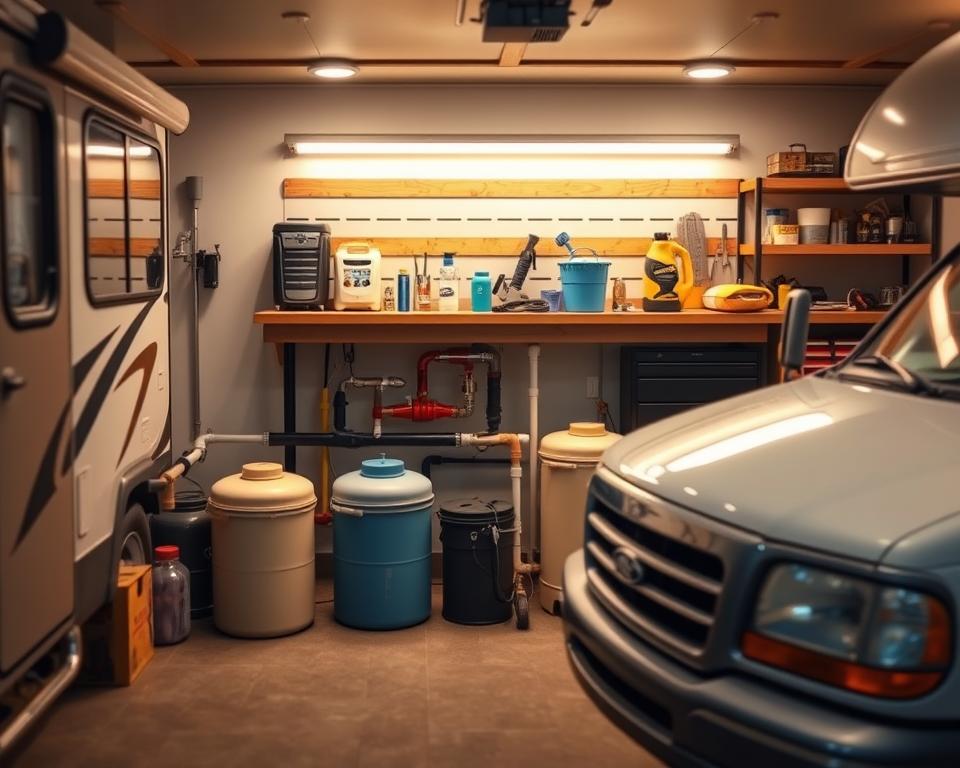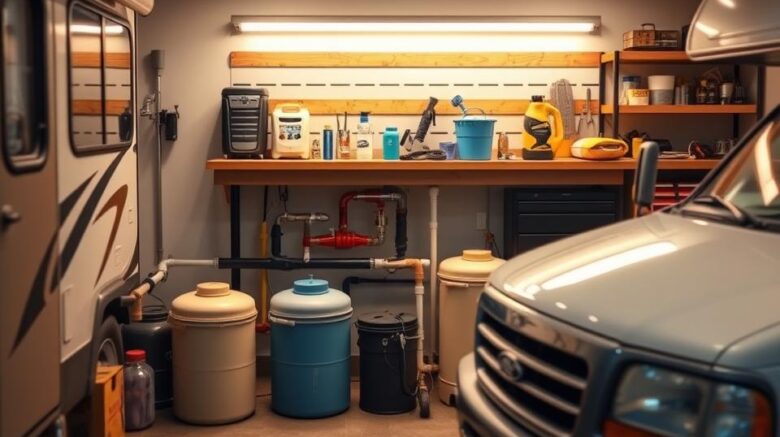RV Waste Pump: Key Care Pointers
Is your RV’s black water pump really ready for the road, or might it cause camping woes? Keeping your motorhome’s waste system in prime condition is essential. It lets you avoid bad smells, back-ups, and pricey harm. Below are crucial advice to ensure your sewage pump functions flawlessly, keeping your travels stress-free.
Understanding Your RV’s Plumbing System
The RV plumbing system is integral for any hassle-free adventure. It divides into two main parts: the black water system and the gray water system – RV sewage pump. The black water system collects waste from the toilet, and the gray water system deals with wastewater from sinks and showers.
The systems utilize drain lines that empty into different tanks, designed for effective waste management. Each tank has a vent to block gas from building up, keeping the operation is safe and scent-neutral. Proper waste management in an RV is vital to avoid leaks or bad odors. By learning about both black and gray water tanks, RV owners can look after and manage waste better.
Understanding how your RV’s plumbing works helps spot issues in advance. Regular maintenance makes trips smoother for everyone. Being proactive with your RV’s plumbing system assures reliability during your travels.
Kinds of RV Water Tanks
Owning RVs involves knowing the different tanks. Each one is vital to your RV’s performance, needing regular upkeep.
The fresh water tank stores drinking water. It’s essential for a enjoyable RV experience.
The gray water tank receives sink, shower, and other non-Septic wastewater. Handling this tank keeps your RV hygienic while traveling. The black water tank, on the other hand, contains toilet waste. It needs routine emptying and careful maintenance to avoid issues.
By learning about the fresh, gray, and black water tanks, RV owners can optimally control their systems. This forethought and steady maintenance secure smooth running of the waste management system.
Black Tank Mechanics
The working of the black water tank is key in RV waste management. It receives waste from the toilet via a gravity-fed system. Upon flushing, waste and water are guided toward the tank, to be stored until removal is necessary. It’s paramount to keep water levels optimized in the toilet to stop solid waste buildup.
Comprehending how RV waste tanks function can circumvent clogs and odors. Without proper care, solid waste hardens, producing blockages and emptying difficulties. Effective tank flushing techniques are critical to preventing these issues, guaranteeing smooth functionality.
Frequent inspection of tank mechanics is advised for RV owners. This includes watching flushing methods and keeping adequate water flow. Knowing these essentials aids in efficient tank maintenance, averting expensive fixes later.

Vital Maintenance Tips for Your RV Black Water Pump
Doing regular maintenance on your RV’s black water pump is critical. Begin with choosing RV-safe toilet paper to minimize clogs and enhance flow. A thorough flush can eliminate waste and reduce bad smells. Periodically cleaning the tank helps halt residue buildup, ensuring your RV sanitary and comfortable.
Carry out routine inspections to assess your pump’s condition. Look for any signs of wear or damage that could affect its function. Using specialized tank treatments, like those from All in Sanitation, can considerably raise both performance and cleanliness. Sticking to these tips can increase your pump’s life and upgrade your RV’s living conditions.
Select Camper-Safe Toilet Paper
Maintaining your RV’s black water system demands crucial measures. One critical move is using RV-safe toilet paper for clog prevention. This dedicated product softens quickly in water, perfect for RV sanitation systems.
RV-safe toilet paper is vital for tank maintenance. It dissolves fast, avoiding blockages from slow-decomposing materials. This improves waste disposal efficiency and keeps the plumbing free-flowing.
Choose brands designated as RV-safe when buying toilet paper. These products reduce clog risks and prolong your black water tank‘s lifespan by preventing buildup. Continual use delivers a stress-free camping experience, void of plumbing troubles.
Flush the Tank Thoroughly
Flushing thoroughly your black water tank is crucial for proper waste management in your RV. To help waste movement, ensure the toilet bowl is sufficiently watered before flushing. Many RVs are equipped with built-in tank flush systems to make the process more efficient. For RVs without this feature, utilizing tank rinsers that attach to the sewer outlet offers a solid alternative.
Regular tank flushing aids waste removal and wards off solid accumulations and bad smells. Keeping up with this process ensures your RV stays odorless, making your travels more pleasant. A habit of regular and complete tank flushing will improve hygiene and the overall condition of your RV’s plumbing system.
Keep Tanks Clear with Steady Cleaning
Holding your RV’s black water tank clear is crucial for its optimal function. Consistent cleaning removes lingering waste inside the tank walls. This means washing well with water and using specific RV tank cleaners for tough deposits.
By cleaning faithfully, you avoid odors and cut down clog risks. A well-maintained tank makes RVing better and helps your plumbing last longer. Build tank maintenance into your routine to secure smooth travels.
Selecting Safe Treatments
Opting for suitable chemicals for RV black water pump maintenance is essential for managing waste and eliminating smells. Many RV enthusiasts favor enzyme-based RV holding tank treatments. These products contain good bacteria to dissolve solids and curb bad odors.
Steering clear of harsh chemicals is critical to prevent damage to your plumbing. Such substances can erode pipes, leading to pricey replacements and diminishing your RV enjoyment. Employing safe chemicals for odor control protects your tank and pump’s longevity.
Keeping your RV black water tank in top condition betters your travel experience. Using the right holding tank treatment regularly makes sure your system works well.
Timely Tank Emptying
It’s essential to empty your RV’s black water tank at the right time for smooth emptying. Try to empty when the tank is about two-thirds full is prudent. This prevents solid waste buildup, providing a smoother emptying process.
Dumping at official stations is vital for safe, eco-friendly waste handling. It’s vital to track the tank‘s levels closely. Letting it fill completely can result in clogs and make disposal more difficult.
Appropriate scheduling and techniques are vital for hygienic waste management and can prolong your plumbing’s life. Staying vigilant and doing proper upkeep guarantees a pleasant RV living experience.
Seal Inspection and Upkeep
Checking seals around the toilet and tank is vital for leak prevention. Over time, these seals might degrade, leading to odors and potential harm. A thorough inspection will uncover any wear or damage. Finding issues early permits quick replacement to guarantee a secure connection and odor-free RV.
Maintaining a bit of water in the toilet bowl supports in preserving seal condition. This safeguard is critical in RV seal upkeep. It lengthens the seals’ life, avoiding leaks and foul odors.
Regular seal maintenance can avoid hefty bills later. By focusing on seal health, RV owners secure a pleasant journey.
Additional Tips for Long-Term Maintenance
Arranging professional servicing for your RV at least once a year is wise, particularly for black water tank care. This strategy supports identifying problems early and protects your plumbing system’s integrity.
When getting your RV for storage, completely clean and empty the black water tank first. Consider antifreeze to guard against damage from remaining water during cold seasons. Taking this step is vital for safeguarding the system, making sure it’s ready for your next adventure.
Regular inspections and preventive actions are essential to lengthening your sanitation system’s life. Observing connections, hoses, and seals guarantees smooth operations. This method boosts your RV experience, making it enjoyable all year round.
Guaranteeing your RV’s black water pump is well-maintained is critical for a stress-free camping journey. By following the maintenance tips shared, you can maintain your black water system operating flawlessly. It’s vital to focus on steady cleansing, utilizing correct flushing methods, and selecting appropriate chemicals for waste management.
By hitting these maintenance requirements, you will sidestep unpleasant odors and blockages. This also increases your RV plumbing system’s durability. Proactive care of the RV black water pump results in more time enjoying the outdoors, absent potential setbacks.
Bear in mind, proper upkeep is key next time you gear up for an outing. It’s not the highlight of RV ownership, yet it significantly improves your travel experience.
